|
|
|
Sort Order |
|
|
|
Items / Page
|
|
|
|
|
|
|
| Srl | Item |
| 1 |
ID:
158725


|
|
|
|
|
| Summary/Abstract |
This article theorises the simultaneous enaction of securitising and desecuritising moves. It argues that the frequent simultaneity of these two processes, which are normally considered mutually exclusive within Securitisation Theory (ST), has previously gone unnoticed given a set of methodological, temporal, and ontological biases that have developed within ST. Demonstrating how these biases can be overcome – and even reconciled with the seminal texts of ST – by drawing on work from within social theory and elsewhere, we argue that the frequent simultaneity of (de)securitising moves most urgently requires us to reconsider the normative status of desecuritisation within ST. Although desecuritisation has traditionally been viewed as normatively positive, we argue that its temporally immanent enaction alongside securitising moves might introduce more violence into security politics and, in fact, exacerbate protracted conflicts. Ultimately, we make the normative ambitions of some within ST more opaque. Desecuritisation is not a shortcut to the ethical-political good within ST.
|
|
|
|
|
|
|
|
|
|
|
|
|
|
|
|
| 2 |
ID:
085722
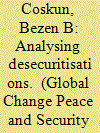

|
|
|
|
|
| Publication |
2008.
|
| Summary/Abstract |
Securitisation theory, which has been developed by a number of scholars affiliated to the Copenhagen Peace Research Institute, has become one of the most attractive analytical tools in contemporary critical security studies. The work of Barry Buzan, Ole waever and others has made a major contribution to our understanding of the dynamics of security by introducing the concepts of 'securitisation' and 'desecuritisation'. However, while this approach has made a major theoretical contribution in general, there have been few attempts at applying the concept of desecuritisation in particular. Moreover, at the theoretical level, there are also problems, notably an under-theorisation of the desecuritisation. This article is an attempt to apply the under-employed/under-theorised concept of desecuritisation to the Israeli-Palestinian case with a particular focus on the potential for desecuritisation arising from Israeli-Palestinian cooperation/coexistence efforts. Based on a conceptual framework that integrates desecuritisation with the concepts of peace-building and peace-making, the article pays attention to peace education efforts involving Israeli and Palestinian civil societies as desecuritisation initiatives.
|
|
|
|
|
|
|
|
|
|
|
|
|
|
|
|
| 3 |
ID:
190913
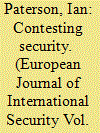

|
|
|
|
|
| Summary/Abstract |
The security-migration nexus is ubiquitous throughout Europe and beyond. An avalanche of scholarship has explored the construction of migration as a security threat in general and, in the UK, the creation of the ‘hostile environment’ in particular – the problematic nature of each being well documented. Yet, far less attention has been paid to activities that contest this process. Deploying Balzacq's four modalities of contestation – desecuritisation, resistance, emancipation, and resilience – this article addresses the imbalance, exploring how asylum and refugee sector NGOs engage in and contest security-migration politics. Using Scotland (2018–19) as an illustrative case and analysing discursive and predominantly non-discursive activities, findings demonstrate that NGOs are successfully contesting the security-migration nexus in Scotland across four principal categories, supporting the ‘surviving’ and ‘thriving’ of asylum seeker and refugee communities, problematising previous conceptualisations of ‘UK’ asylum and refugee politics, with implications extending globally. The article helps refine the theorisation of contestation, demonstrating first, the need to move beyond studies of ‘desecuritisation’, with consequences for understandings of ‘success’ in securitisation, and second, the potential blindness of single-modality studies to vital, meaningful contestation, resulting in the production of less comprehensive visions of the security world.
|
|
|
|
|
|
|
|
|
|
|
|
|
|
|
|
| 4 |
ID:
183899
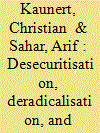

|
|
|
|
|
| Summary/Abstract |
This article assesses the processes and trends of desecuritisation through the deradicalisation of identity politics within the higher education sector in Afghanistan. It examines the desecuritisation of radicalisation through efforts directed at deradicalisation in the context of a securitised conflict environment. The article draws on the data generated through interviews and discussions with actors engaged with higher education. Higher education, while manipulated by numerous actors for ideo-political purposes, can function as a ‘desecuritisation’ and ‘deradicalisation’ mechanism by supplementing the statebuilding efforts, and more subtly, by providing a venue for critical teaching and learning processes. This article highlights that while the sector is typically a very low reconstruction priority, if addressed strategically, it has the potential to contribute to the desecuritisation of ethnic politics through the deradicalisation of ethnic grievances and hence function as a catalyst for effective and sustainable postwar recovery.
|
|
|
|
|
|
|
|
|
|
|
|
|
|
|
|
| 5 |
ID:
157093
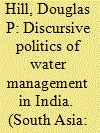

|
|
|
|
|
| Summary/Abstract |
Orthodox approaches to managing Himalayan rivers endorse a singular focus on water as a resource to be harnessed for national security and economic progress, as epitomised by the proposed acceleration of large-scale hydropower construction in the Brahmaputra basin. In reality, existing large-scale hydropower development in the region frequently involves corruption, environmental destruction and forced displacement. This paper argues for an alternative approach to understanding the role of water in India's extractive zones within and beyond the boundaries of the nation, utilising the notions of ‘embeddedness’, ‘hydro-informality’ and ‘rescaling politics’. It is argued that reframing the river in this way can open up space for more just and sustainable practices.
|
|
|
|
|
|
|
|
|
|
|
|
|
|
|
|
| 6 |
ID:
163174
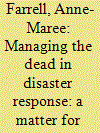

|
|
|
|
|
| Summary/Abstract |
This paper explores the securitisation-desecuritisation nexus in managing threats to health, drawing on a case study examining the management of the dead in disaster response in the Asia-Pacific region. While securitising health threats may galvanise political action to address capacity, infrastructure and resource constraints, it is vital that the shift towards desecuritisation takes place once the immediate threat is under control. This is because desecuritisation is likely to create an environment in which established humanitarian, public health and forensic practices for addressing such threats can proceed in the context of normal politics. It will also offer greater flexibility for pursuing post-threat resilience strategies which will enhance individual and collective health and wellbeing. In turn, this may address broader human security concerns. Conceptualised in this way, resilience should be seen not merely as a strategy for resisting or adapting to a securitised situation but also as a key strategy to be deployed in the context of desecuritisation.
|
|
|
|
|
|
|
|
|
|
|
|
|
|
|
|
| 7 |
ID:
142779
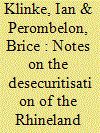

|
|
|
|
|
| Summary/Abstract |
During the first half of the twentieth century, the river Rhine constituted the key source of insecurity between France and Germany. Contemporary observers have claimed that the river lost this role in the 1950s due to the dynamics of Franco-German rapprochement and the emergence of the European Coal and Steel Community. This article tries to complicate this story in three steps. First, it shifts attention from early European integration to the North Atlantic Treaty Organization and its role in the desecuritisation of the Rhine. Subsequently, it discusses the river’s loss of strategic significance in West Germany due to the particularities of post-war statehood and the country’s idiosyncratic geopolitics. Finally, the article argues that it was only the development of an independent French nuclear deterrent capacity between 1966 and 1972 that ultimately took the boundary from France’s geopolitical map.
|
|
|
|
|
|
|
|
|
|
|
|
|
|
|
|
| 8 |
ID:
113297
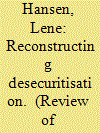

|
|
|
|
|
| Publication |
2012.
|
| Summary/Abstract |
The concept of desecuritisation - the move of an issue out of the sphere of security - has been the subject of heated international political theory debate and adopted in case studies across a range of sectors and settings. What unites the political theory and the applied literature is a concern with the normative-political potential of desecuritisation. This article documents the political status and content of desecuritisation through four readings: one which shows how desecuritisation is a Derridarian supplement to the political concept of securitisation; one which traces the understanding of the public sphere's ability to rework the friend-enemy distinction; one which emphasises the role of choice, responsibility, and decisions; and one which uncovers the significance of the historical context of Cold War détente. The last part of the article provides a reading of the varied use of desecuritisation in applied analysis and shows how these can be seen as falling into four forms of desecuritisation. Each of the latter identifies a distinct ontological position as well as a set of more specific political and normative questions.
|
|
|
|
|
|
|
|
|
|
|
|
|
|
|
|
| 9 |
ID:
163325
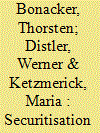

|
|
|
|
|
| Summary/Abstract |
The United Nations has engaged in (neo)trusteeship statebuilding in two different contexts: post-Second World War decolonisation and after the Cold War. On both occasions, statebuilding aimed at preventing organised, large-scale violence. Nevertheless, these statebuilding efforts were confronted by several forms of violence, ranging from civil war to a high level of politically motivated violence. In this article, we ask how and why administrations in French Cameroon, New Guinea, Kosovo and Timor-Leste implementing (de)securitised such violence – by addressing it as a serious threat and imple-menting policies of protection, by portraying it as something manageable or even by ignoring it.
|
|
|
|
|
|
|
|
|
|
|
|
|
|
|
|
| 10 |
ID:
195259


|
|
|
|
|
| Summary/Abstract |
The contemporary defence sector is dominated by dual-use technologies which have both military and civilian applications. The trade of these technologies is governed by export controls. Designation of technologies as “dual-use” and export control regimes can be considered as securitisation of such technologies. Securitisation refers to the discursive construction of existential threats. This article seeks to understand which actors desire securitisation or its opposite, desecuritisation, of technology. The contribution of this research is twofold. Firstly, securitisation of technology has implications for understanding defence and security in contemporary Europe. Secondly, identifying the actors involved in (de)securitisation allows for the analysis of their different roles in determining security discourses around technologies. The article builds on the literature on securitisation theory. Then it explores the EU-level export control regimes and afterwards focuses on a single case study of the Netherlands both as representative of smaller European states with an SME-heavy defence sector and as an example of an expanded export control regime by a member state. To conduct the analysis, I use the data obtained through a workshop with representatives of Dutch defence companies as well as a survey that has been answered by security and defence experts.
|
|
|
|
|
|
|
|
|
|
|
|
|
|
|
|
| 11 |
ID:
179539
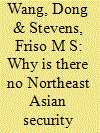

|
|
|
|
|
| Summary/Abstract |
Exploring the ‘organization gap’ that exists in Northeast Asia, this article seeks to explain why there is no such minimal, Deutschian security community and discerns four impediments: played up islands disputes as a symptom of deep resentment shaped by histories of war and animosity; the rise of a fervent form of nationalism related to collective memories and projected at ‘the other;’ the American alliance system and China-US strategic distrust and rivalry; and the nuclear weapons pursuit of North Korea. Contrasting the fatalist logic of the dominant neorealist paradigm, the article goes into the deeper underlying and interconnected obstacles that sustain opposing blocs in Northeast Asia in a spiral of mistrust and arming. Arriving at the ‘Concert,’ or ‘Community’ proposed by White and Kissinger means that the structural, power aspect as well as the domestic socio-historic dynamics particular to Northeast Asia should be examined first. In doing so, the article puts forth conditions under which a process of ‘desecuritisation’ can lead to a viable community in Northeast Asia.
|
|
|
|
|
|
|
|
|
|
|
|
|
|
|
|
|
|
|
|
|